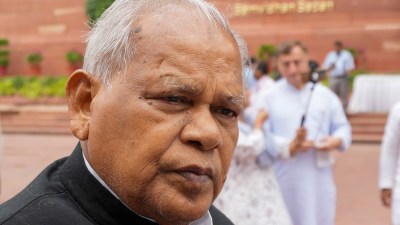Should not be falsely equated: MEA on UK report on extremism
Responding to this, the Ministry of External Affairs’ official spokesperson Randhir Jaiswal said, “We have seen some reports on this matter. The nature of the separatist and extremist threat out of the UK is well known. It should not be condoned or falsely equated.”
 Ministry of External Affairs’ official spokesperson Randhir Jaiswal
Ministry of External Affairs’ official spokesperson Randhir Jaiswal After two types of extremism with their origins in the Indian subcontinent — pro-Khalistan extremism and Hindu nationalist extremism — were flagged as threats to “understand” in a leaked UK Home office report, India said Friday that the “nature of the separatist and extremist threat out of the UK is well known”, and “should not be condoned or falsely equated”.
‘Extremely Confused: The government’s new counter-extremism review revealed’, authored by Andrew Gilligan and Dr Paul Scott for the Policy Exchange think tank released earlier this week, claims “Hindu nationalist extremism” has found a mention in such a review for the first time.
Responding to this, the Ministry of External Affairs’ official spokesperson Randhir Jaiswal said, “We have seen some reports on this matter. The nature of the separatist and extremist threat out of the UK is well known. It should not be condoned or falsely equated.”
Earlier, UK Home Office Security Minister Dan Jarvis told the House of Commons Tuesday that it was “not entirely clear which version of the report was leaked” and stressed that its claims did not represent government policy.
It follows Home Secretary Yvette Cooper ordering a ‘Rapid Analytical Sprint’ last August to determine the Labour government’s policy on extremism.
As per the leaked report, the longest section is labelled “Understand” and lists nine types of extremism in the following order – “Islamist, extreme right-wing, extreme misogyny, pro-Khalistan extremism, Hindu nationalist extremism, environmental extremism, Left wing, anarchist and single-issue extremism (LASI), violence fascination and conspiracy theories”.
“Pages 17-18 of ‘Understand’ are devoted to two types of extremism which have their origins in the Indian subcontinent – what is described as pro-Khalistan extremism and Hindu nationalist extremism. With regards to the former, the report offers the caveat that support for a Sikh state of Khalistan is not necessarily extremist; the problem is when this outlook leads to the advocacy of violence in support of that cause,” reads the Policy Exchange report.
“That is a logical position for the UK government to take. However much more controversial will be assessment of a ‘growing portfolio of actors of concern’ within Khalistan movement; and reference to activism which contributes to ‘the demonisation of Muslim communities, in particular about child sexual exploitation allegations’ and what are seen as conspiracy theories alleging collusion between the British and Indian Governments,” it reads.







